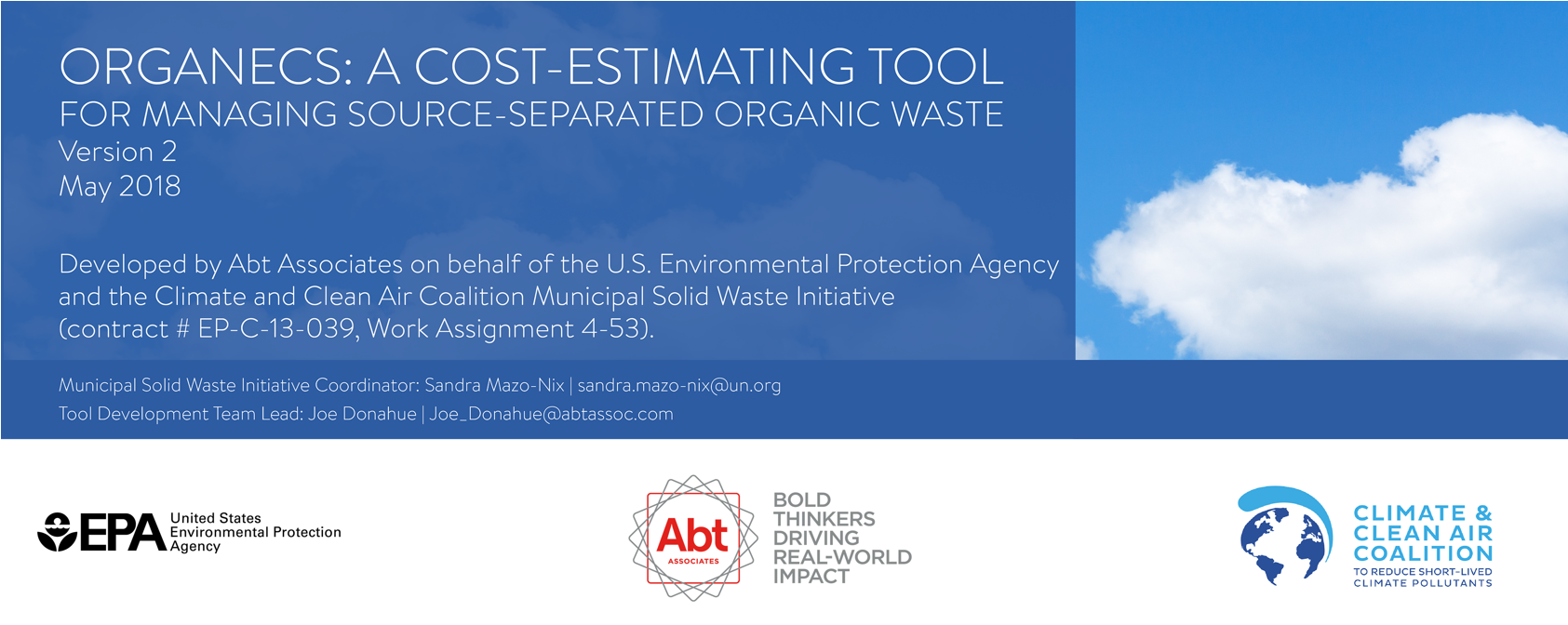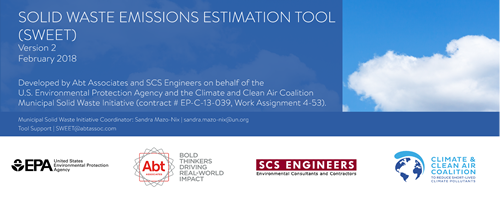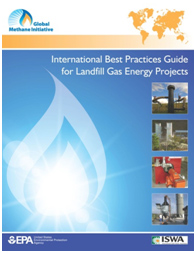MSW Tools
Prepared by the Wilson’s Center China Environment Forum with assistance provided by GMI, the report highlights food waste trends in Chinese cities and assesses the possibilities of redirecting food waste to municipal wastewater (MWW) and sludge-to-energy (StE) plants. This report also highlights some specific gaps that GMI and other organizations could help fill and potential Chinese partners to engage with to highlight the environmental and economic benefits of co-digestion.
In March 2017, the U.S. Environmental Protection Agency – as a lead partner in the Waste Initiative – conducted a waste characterization study at the municipality’s transfer station. The study indicated that approximately 69% of the waste handled at the transfer station could be recycled or otherwise diverted from the landfill, and that more than half of the waste could be used as feedstock in composting or anaerobic digestion projects. The municipality is using the results of the study to inform decision making about the project design and procurement options.
The Wilson Center’s China Environment Forum (CEF) produced this sludge scoping report for the U.S. EPA and the Global Methane Initiative. The report describes drivers that created mountains of municipal sludge, introduces key political and research entities involved in sludge regulation in China, reviews obstacles in adoption of anaerobic digestion, provides a case study of the challenges facing sludge-to-energy projects, and highlights opportunities for U.S. government, cities, and companies to engage with Chinese government agencies.
 OrganEcs aims to help local decision makers in their first evaluation of different treatment options (e.g., composting options and/or anaerobic digestion options). OrganEcs helps users determine the economic feasibility of waste management scenarios by calculating tipping fees, sales of products (e.g., organic compost), and the internal rate of return. OrganEcs use requires expert support.
OrganEcs aims to help local decision makers in their first evaluation of different treatment options (e.g., composting options and/or anaerobic digestion options). OrganEcs helps users determine the economic feasibility of waste management scenarios by calculating tipping fees, sales of products (e.g., organic compost), and the internal rate of return. OrganEcs use requires expert support.
 SWEET is a free Excel tool created by the Waste Initiative. SWEET helps users scope emissions sources such as waste collection and transportation, open burning, landfill gas collection systems, organic waste management projects, waste handling equipment (e.g., bulldozers), and waste incineration facilities. It estimates waste sector emissions including methane, black carbon, and several other pollutants. It also evaluates emissions reduction benefits of multiple alternative waste management scenarios.
SWEET is a free Excel tool created by the Waste Initiative. SWEET helps users scope emissions sources such as waste collection and transportation, open burning, landfill gas collection systems, organic waste management projects, waste handling equipment (e.g., bulldozers), and waste incineration facilities. It estimates waste sector emissions including methane, black carbon, and several other pollutants. It also evaluates emissions reduction benefits of multiple alternative waste management scenarios.
International Best Practices Guide for Landfill Gas Energy Projects
 The
Global Methane Initiative’s new International Best Practices Guide for Landfill
Gas Energy (LFGE) Projects provides a broad overview of the development
process for LFGE projects and presents the technological, economic and political
considerations that typically affect the success of LFGE projects in international
settings. The guide presents best practices that encourage environmentally and economically
sound LFGE projects and connects stakeholders with available information, tools
and services. It is intended for representatives of national, regional, and local
governments; landfill owners; energy service providers; corporations and industries;
and representatives of not-for-profit organizations.
The
Global Methane Initiative’s new International Best Practices Guide for Landfill
Gas Energy (LFGE) Projects provides a broad overview of the development
process for LFGE projects and presents the technological, economic and political
considerations that typically affect the success of LFGE projects in international
settings. The guide presents best practices that encourage environmentally and economically
sound LFGE projects and connects stakeholders with available information, tools
and services. It is intended for representatives of national, regional, and local
governments; landfill owners; energy service providers; corporations and industries;
and representatives of not-for-profit organizations.
- Title page and Acknowledgments
(PDF) (4 pp, 1.7MB)
- Executive Summary (PDF)
(2 pp, 390 KB)
- Contents, Abbreviations
and Introduction (PDF) (6 pp, 520KB)
- Chapter 1. Basic Concepts of Integrated
Solid Waste Management (PDF) (8 pp, 855KB)
- Chapter 2. Solid Waste Disposal
Site Design and Operational Considerations (PDF) (10 pp,
717KB)
- Chapter 3. Design, Construction
and Operation of Landfill Gas Collection and Control Systems (PDF) (12
pp, 841KB)
- Chapter 4. Landfill Gas Energy Utilization
Technologies (PDF) (18 pp, 1.1MB)
- Chapter 5. Market Drivers for LFGE
Projects (PDF) (12 pp, 450KB)
- Chapter 6. Landfill Gas Modeling
(PDF) (14 pp, 620KB)
- Chapter 7. Project Economics and
Financing (PDF) (13 pp, 580KB)
- Appendix A. Case Studies (PDF)
(34 pp, 3.3MB)
- Appendix B. Health and Safety
Considerations (PDF) (4 pp, 407KB)
- Download the complete guide
(PDF) (140 pp, 10MB)
Landfill Gas Modeling Tools
Several country-specific landfill gas generation models have been developed by the
U.S. Environmental Protection Agency Landfill Methane Outreach Program. These models
were created to help landfill owners and operators and other interested parties
evaluate the feasibility and potential benefits of collecting and using LFG for
energy recovery.
Global Methane Initiative
Guide to On-Line Landfill Gas Resources (XLS, 221 KB)
This guide has been formatted so that you can filter and search for resources by:
- Topic: LFG recovery and use, clean development mechanisms, climate change, and renewable
energy
- Type of resource: guidance documents, pre-feasibility studies, databases, case studies,
software, approved methodologies, and more
- Applicable country or region, and
- Authoring organization
Resource Packet for Industrial Use of Landfill Gas
This resource packet includes several tools to assist in a preliminary evaluation
of a direct-use project.
Listed below are descriptions of the content and use for each tool in the packet:
- Direct-Use of Landfill Gas for Energy - This fact sheet provides
a brief introduction to direct-use project types, the economic and environmental
benefits of these projects, and considerations that should be addressed during the
development of a direct use project.
- Adapting Boilers to Utilize Landfill Gas - This fact sheet discusses
the technical and engineering issues associated with using LFG in boilers originally
designed to burn other fuels. Since the most common application of LFG at an industrial
facility is boilers, this fact sheet will help you understand what type of modifications
are required to utilize LFG in a boiler. Although it is focused on boilers, many
of the modifications required to allow a boiler to utilize LFG also pertain to other
equipment considered for LFG utilization.
- Industrial Facility Data Collection Form - Outlines the basic information
needed to begin an evaluation of an industrial facility for a direct-use project
by understanding its energy utilization profile. This data collection form is intended
as a general guide for preliminary evaluation and should not be assumed to capture
all important aspects critical to a successful direct-use project.
- Direct-Use of Landfill Gas for Energy - This fact sheet provides
a brief introduction to direct-use project types, the economic and environmental
benefits of these projects, and considerations that should be addressed during the
development of a direct use project.
- Solid Waste Disposal Site Data Collection Form - Outlines the basic
information needed to evaluate an SWD for its energy potential and suitability for
a direct-use project.
- International Unit Conversion Table - Units of measurement for
SWD sites and energy projects can vary throughout the world, and this table will
help translate units common to LFGE projects.
The material in this packet can help you conduct a preliminary evaluation of a direct-use
project. Successfully capitalizing on the value of these opportunities requires
careful evaluation, and GMI can provide assistance with all the steps of the evaluation
process.
World Bank Data Collection Tool for Urban Solid Waste Management
The new Data Collection Tool for Urban Solid Waste Management was developed by the
World Bank
 in collaboration with the Global Methane Initiative’s MSW sector. The tool provides
a framework to assist with collecting important solid waste and waste management
data to facilitate new and ongoing strategic planning, support and project development.
It is intended for use by municipalities and local representatives, project developers,
site operators, and potential investors.
in collaboration with the Global Methane Initiative’s MSW sector. The tool provides
a framework to assist with collecting important solid waste and waste management
data to facilitate new and ongoing strategic planning, support and project development.
It is intended for use by municipalities and local representatives, project developers,
site operators, and potential investors.
Additional Resources for Municipal Solid Waste
- World Bank Data Collection Tool for Urban Solid Waste Management (Excel, 247 KB)
 and User Manual (PDF, 9 pp, 235 KB)
and User Manual (PDF, 9 pp, 235 KB) 
- Asian Development Bank Document: Toward Sustainable Municipal Organic Waste Management in South Asia: A Guidebook for Policy Makers and Practitioners (PDF, 88 pp, 1.6 MB)

- Environment Canada MSW Organics Processing Guide (PDF, 220 pp, 11.4 MB)
- June 2012 World Bank Report: What a Waste: A Global Review of Solid Waste Management

- energie-pflanzen publishes article (PDF, 1 pp, 118 KB) on GMI Partnership-Wide meeting.
- ISWA Landfill Operational Guidelines (PDF, 106 pp, 2.1 MB)
 - This document is also available in Spanish (PDF, 104 pp, 1.87 MB)
- This document is also available in Spanish (PDF, 104 pp, 1.87 MB) 
- International Energy Agency (IEA): Turning a Liability into an Asset: the Importance of Policy in Fostering Landfill Gas Use Worldwide 2009 (PDF, 31 pp, 2.6 MB)

- International Energy Agency (IEA): Turning a Liability into an Asset: Landfill Methane Recovery in India 2008 (PDF, 25 pp, 430 KB)

- U.S. EPA's Landfill Methane Outreach Program (LMOP)
 - Contains a variety of technical and informational resources to assist with the development of landfill gas (LFG) to energy projects.
- Contains a variety of technical and informational resources to assist with the development of landfill gas (LFG) to energy projects.
- Community Methane Model (CMM) in Brazil


